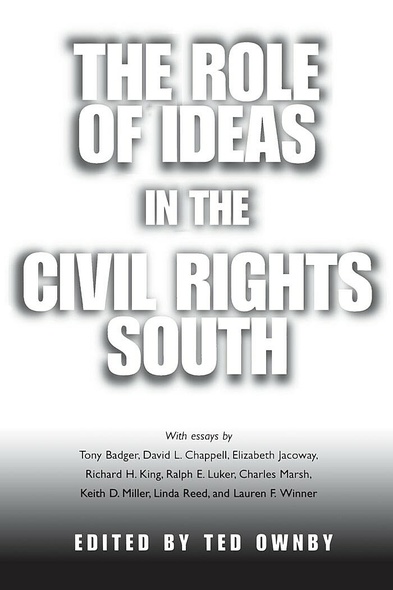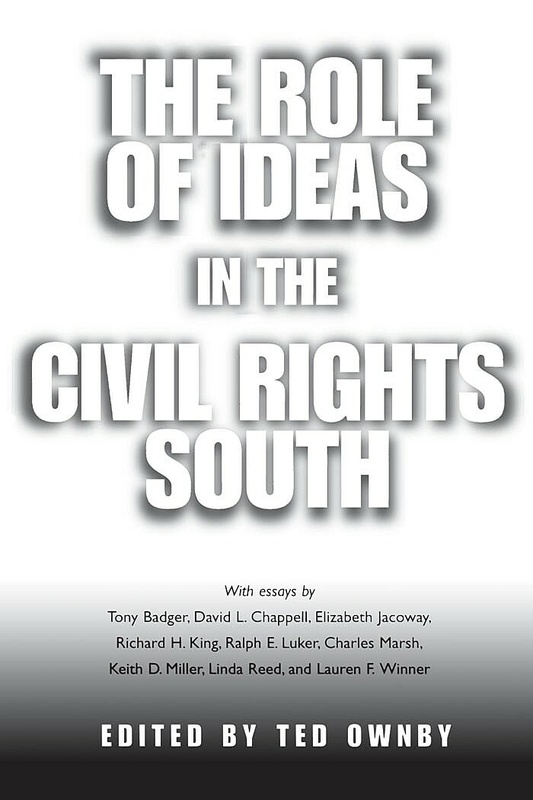
With essays by Tony Badger, David L. Chappell, Elizabeth Jacoway, Richard H. King, Ralph E. Luker, Charles Marsh, Keith D. Miller, Linda Reed, and Lauren F. Winner
In the 1950s and 1960s the American South was in upheaval. Brilliant thinkers and writers joined on-the-ground activists to challenge segregation and the South's long established Jim Crow society. The men and women who opposed them waged a war of words in favor of the status quo.
The essays in The Role of Ideas in the Civil Rights South examine the interplay of thought and action in a complex and turbulent moment in American history. Written by scholars in history, English, and religious studies, these essays explore ideas about religion, freedom, race, liberalism, and conservatism.
When people challenged authority, or defended it, what ideas did they uphold? What were their moral and intellectual standards? What language did they use, and what sources did they cite? What issues did they feel needed explaining, what issues did they take for granted, and what issues did they avoid?
Leading scholars investigate the wide range of conceptions, interpretations, and responses to the whirlwind of change. Some of the essays concentrate on intellectuals who were systematic thinkers who published their work to be studied, analyzed, and used. Four essays center on the ideas of Martin Luther King, Jr., surely the most influential southern intellectual in the 1950s and 1960s. Other essays analyze the thoughts of people, such as civil rights activist Fannie Lou Hamer and segregationist politician Jim Johnson, who never saw themselves as intellectuals.
The civil rights movement set the agenda for thought and action in the 1950s and 1960s. The Role of Ideas in the Civil Rights South begins by examining ideas prominent in the movement. It then studies the ideas of white moderates in the South, white conservatives, and African Americans who did not join the movement. Particular emphases include the relationship between theology and political life, the national and international contexts of southern thought, and the variety of southern intellectual interests.
With essays by Tony Badger, David L. Chappell, Elizabeth Jacoway, Richard H. King, Ralph E. Luker, Charles Marsh, Keith D. Miller, Linda Reed, and Lauren F. Winner
In the 1950s and 1960s the American South was in upheaval. Brilliant thinkers and writers joined on-the-ground activists to challenge segregation and the South's long established Jim Crow society. The men and women who opposed them waged a war of words in favor of the status quo.
The essays in The Role of Ideas in the Civil Rights South examine the interplay of thought and action in a complex and turbulent moment in American history. Written by scholars in history, English, and religious studies, these essays explore ideas about religion, freedom, race, liberalism, and conservatism.
When people challenged authority, or defended it, what ideas did they uphold? What were their moral and intellectual standards? What language did they use, and what sources did they cite? What issues did they feel needed explaining, what issues did they take for granted, and what issues did they avoid?
Leading scholars investigate the wide range of conceptions, interpretations, and responses to the whirlwind of change. Some of the essays concentrate on intellectuals who were systematic thinkers who published their work to be studied, analyzed, and used. Four essays center on the ideas of Martin Luther King, Jr., surely the most influential southern intellectual in the 1950s and 1960s. Other essays analyze the thoughts of people, such as civil rights activist Fannie Lou Hamer and segregationist politician Jim Johnson, who never saw themselves as intellectuals.
The civil rights movement set the agenda for thought and action in the 1950s and 1960s. The Role of Ideas in the Civil Rights South begins by examining ideas prominent in the movement. It then studies the ideas of white moderates in the South, white conservatives, and African Americans who did not join the movement. Particular emphases include the relationship between theology and political life, the national and international contexts of southern thought, and the variety of southern intellectual interests.




